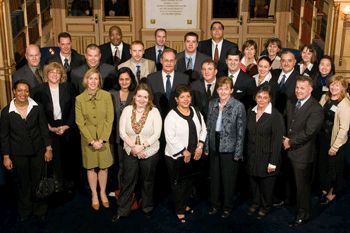WASHINGTON, D.C. — The Partnership for Public Service today announced the start up of an innovative leadership training laboratory to help the federal government tackle the nation’s most pressing issues – before they become public crises.
Through unique public-private partnerships the Annenberg Leadership Institute will tap the management expertise of the private sector, academia and federal agencies – to provide a select group of promising mid-level federal servants with cutting-edge leadership skills to address issues ranging from food safety to veterans health care.
“Inadequate leadership and weak management skills are two of the greatest impediments to effective government,” said Max Stier, president of the Partnership for Public Service. “The goal of the Annenberg Leadership Institute is to build the management skills of federal managers, and improve federal agencies performance – so ultimately they can better serve the American people.”
The Partnership created the Institute because research – including the Partnership’s Best Places to Work in the Federal Government rankings – consistently shows that the federal government lags the private sector in leadership and management skills. Federal workers are twice as likely as those in the private sector to report that their supervisors do not have the leadership and management skills to do their jobs effectively.
The Partnership’s Annenberg Leadership Institute will enlist pro-bono management training experts from corporate leaders including Accenture, Lockheed Martin, IDEO, and Aon Consulting. They will serve as faculty for the Institute’s seven-month program and as private training coaches for the Annenberg Fellows. The Defense Logistics Agency and Georgetown University will also lend leadership expertise to the Institute.
The Institute’s inaugural class of 32 Annenberg Fellows were hand-picked by their agencies and the Annenberg Leadership Institute. They come from the Food and Drug Administration, the Department of Agriculture’s Food Safety and Inspection Service, the Veterans Health Administration, the Department of Energy, the Office of Management and Budget, and the Small Business Administration.
Teams of fellows will work on projects identified as critical by their agencies and include:
- Improving agency coordination and public communication surrounding our nation’s food supply. Each year, nearly 76 million people contract a food-borne illness in the United States; about 325,000 require hospitalization; and about 5,000 die. In response to the recent series of food recalls, Annenberg Fellows at the Food and Drug Administration and Department of Agriculture’s Food Safety and Inspection Service will work on a project to strengthen agency coordination and public communications during food recalls.
- Recruiting nearly 30,000 doctors, nurses and other health professionals to care for wounded veterans. Annenberg Fellow teams from the Veterans Health Administration will develop innovative recruiting strategies to attract the nearly 30,000 doctors, nurses, and other medical professionals VHA needs to hire to care for our wounded veterans.
- Improving employee morale at the Small Business Administration to enhance their ability to provide vital services to small businesses. Ranked low among small federal agencies in the Partnership’s Best Places to Work rankings, the SBA Annenberg Fellow team will develop strategies to better engage and retain its workers.
- Recruiting more than 1,000 engineers and other employees to ensure sufficient, clean energy for the country. An Annenberg Fellows team will develop new recruiting tactics for the Department of Energy in order to attract more than 1,000 of the best and brightest engineers and other employees needed to secure sufficient, clean energy for the country.
According to Tom Fox, director of the Annenberg Leadership Institute, the Institute distinguishes itself from existing government leadership programs in two ways:
- Critical issues of national consequence will be addressed at the source – within federal agencies. The projects will address and find fixes for real needs or problems through hands-on action learning projects;
- A unique cross-section of partners will share their leadership and management expertise with the Annenberg Fellows in classroom activities, during hands-on learning projects and through one-on-one training.
The Annenberg Leadership Institute is made possible by a grant from The Annenberg Foundation. The Partnership for Public Service works to revitalize the federal government by inspiring a new generation to serve and by transforming the way government works. Visit www.ourpublicservice.org for more information.
More information here: www.ourpublicservice.org
Thirty-two career federal employees are part of the seven-month leadership development program. Among the 2008 inaugural class of fellows are physicians, law enforcement officials and research pharmacists with Ph.D degrees. The gender ratio is 55 percent female to 45 percent male. Most of the participants selected for the inaugural class are in their 30s to early 40s. About 40 percent of the class members live outside the Washington metropolitan area. Most are GS-13 and GS-14 career civil service employees. Photo Credit: Sam Kittner / Kittner.com





